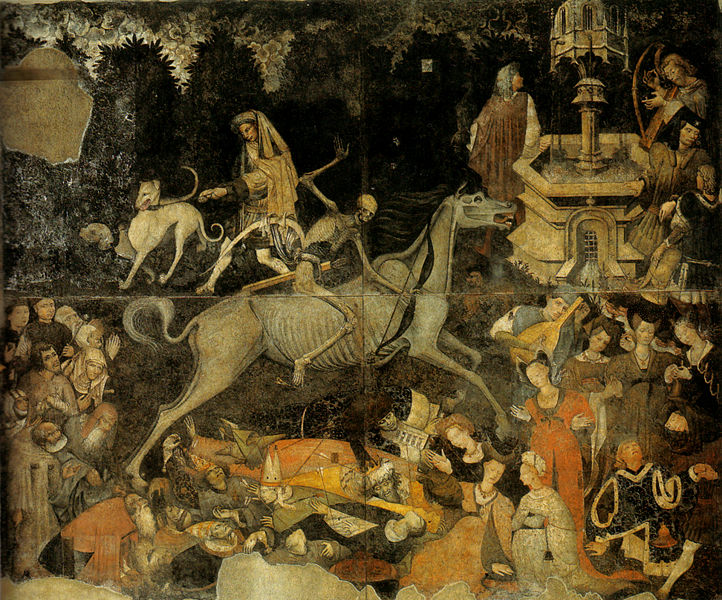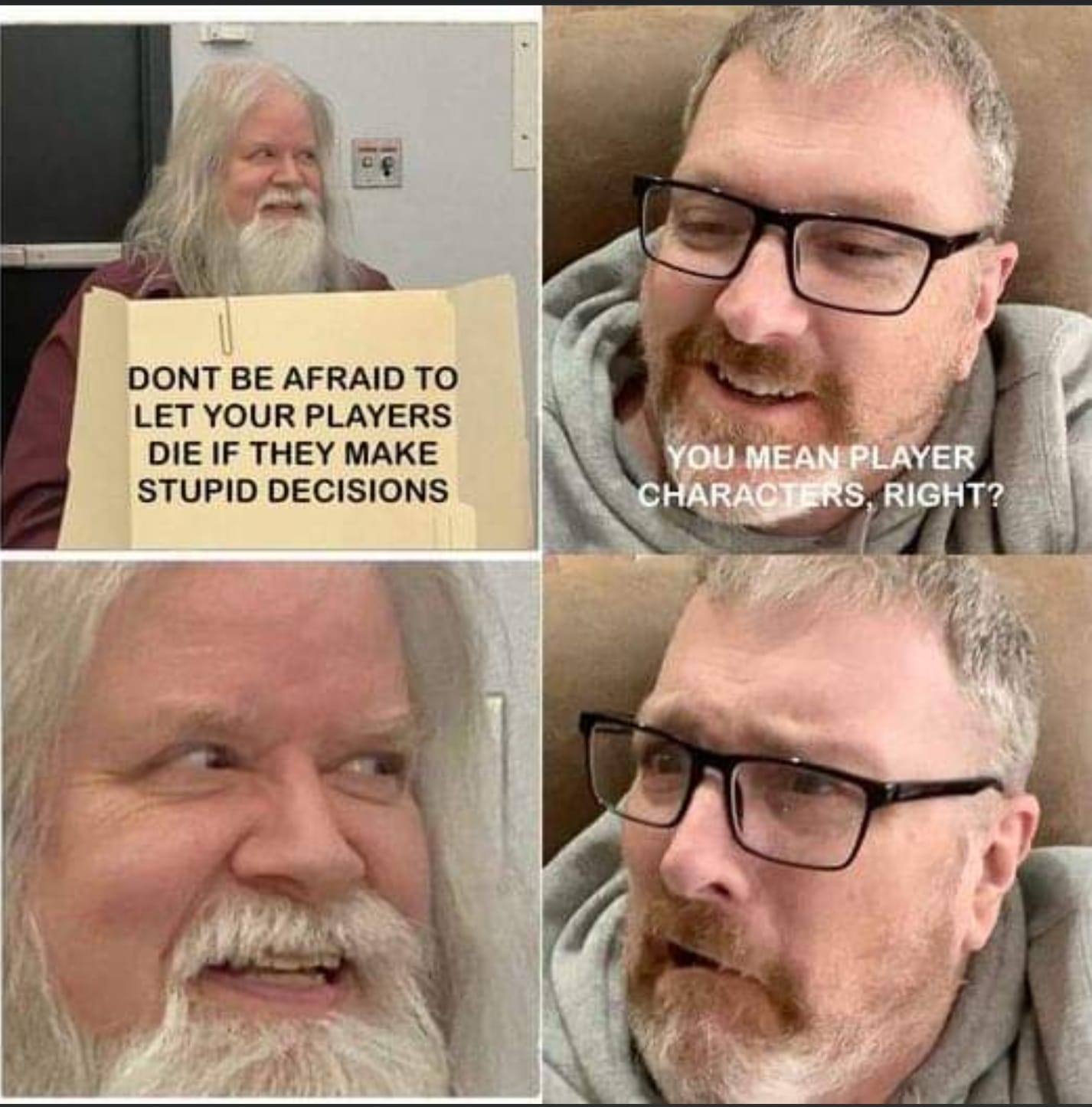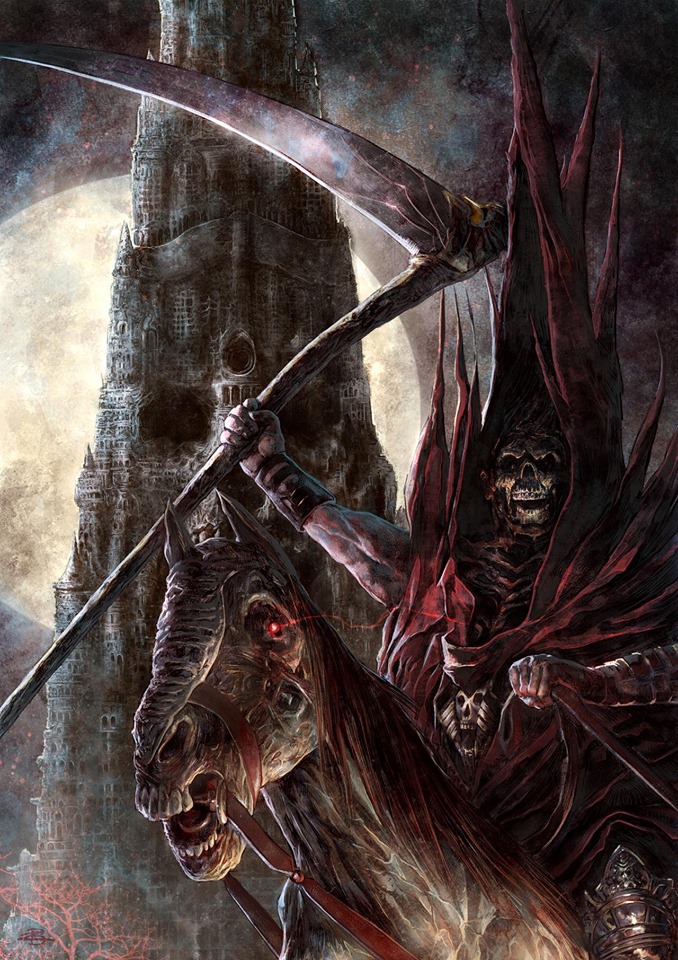____________________________________________________________________________________________________________
Death-

____________________________________________________________________________________________________________
Death-

____________________________________________________________________________________________________________
|
|
|
|
|
(Or Disorder) Or Parasitic Infestation |
|
Disease, and Death |
|
 |
|
|
|
|
|
|
|
|
|
|
|
|
|
|
|
|
|
|
|
|
|
|
|
|
|
|
|
|
|
|
|
|
|
|
|
|
|
|
|
|
|
|
|
|
DEATH --> Astral -->
|
|
|
|
|
|
|
|
|
|
|
|
|
|
|
|
|
|
|
|
|
|
|
|
|
|
|
|
|
|

-
The character faces 0death0
in many forms.
Question: We are having
an argument as to whether or not
a character was killed in
combat.
You see, we had to leave him
lying on the floor of a
dungeon
and could not find him when we
returned. One guy (it was
his character) says that he got up and
left. Well, we found out
later that the character we had had to
leave had been assassinated
by another PC.
Well, the guy who assassinated
the first character says he is
dead and the other guy says
he isnít, and now everyone is
divided over the issue.
Is the guy dead or not?
Answer: I couldnít
tell you.
I take it that you are not
the DM by the wording of your {quest}.ion.
All that I can say is whatever
your DM says about the issue must stand.
Whether he was killed or
not is not up to the players to decide, IT IS UP TO THE DM.
The DM has apparently decided
not to tell you one way || the other, and that is his right.
You also mentioned in your
letter your concern about players
arguing through their characters.
If your DM wishes to allow strife in the
dungeon,
that too is his business. Interaction between characters is
encouraged, and sometimes
arguments && misunderstanding will
manifest themselves. This
is to be expected. In fact. it isnít necessarily
out of line for them to
TURN on each other. Some DMs encourage this.
Remember, whatever the DM
decides is final. If you donít like the
way he plays, donít play
with him. The only way you can get a DM to
play differently is to remove
your character from his game. If enough
people do this, hopefully
he will see the error of his ways and attempt to
mend them. I cannot stress
enough the fact that you shouldnít argue
with your DM. His word is
the final say in his campaign.
QUESTION:
There is this character (a M-U) being
refereed by an inexperienced DM.
Because of his lack of knowledge,
he let the character advance in levels too quickly.
He also has 86 magic
items.
By the time
the character got to 34th level, the DM had learned from his mistakes and
proceeded to try to kill the powerful character.
He tried a Ring of Transference,
and when that didnít work he hit him with 2000 (100% MR)
thieves.
<define: ring of transference>
Is it within the D&D
|| AD&D rules for a DM to deliberately
try to kill a character?
ANSWER: NO, it is
not. There are classier ways to handle a
ďmonsterĒ
that you have created. One of the best ways, I feel, is to
inform him that because
of his high level he is now a member of the city council
and therefore must {aid} in the running of
the city.
This, if done properly,
will prohibit the character from further adventuring.
The city elders certainly
would not want nor like their high-level M-U
running around in some dangerous old dungeon.
When this happens,
reassure the player that
his character isnít dead, just retired, and he
canít play him anymore.
The character should then fall into your hands
and become a NPC
subject to your will and yours
alone. However, you can
ask advice from the player whenever a
situation arises where you
arenít sure how the character would react.
This will give the player a feeling that the character still belongs to him.
A DM should be creative.
Find things for the powerful
character to do.
Get him involved with politics.
There are many ways to keep
a character busy.
The character could have
sons && daughters to continue the ____blood
line____.
A
word of warning: Donít let any of the characterís magic fall into the
hands of his children.
Tell them they must find
their own. If you donít, you will only be defeating yourself.
If you
donít like this method or you canít do it, you can tell the
player you will not allow
him to play in your campaign until he either
retires the character himself
or lets you take away most of his magic.
I know this sounds cruel,
but sometimes it is necessary.
If
things get really bad, you can always blow up your world and start a new
campaign.

But, if at all possible,
try to keep the character so busy as an NPC that
any thoughts of adventuring
are just pleasant memories of when he
was younger.
We all
make mistakes when we first start a campaign.
Correcting them is the hard
part.
Try to xplain to your powerful
players that the game balance is now lost and you
would like their help in restoring it.
I am sure if you ask them
nicely, they will be glad to help.
The game
is supposed to be fun.
If you are having a miserable
time,
why play?
Q: How about some guidelines on character wills?
A: Wills, of course,
have to be written
before death; furthermore,
the beneficiary
of the will gets only the
wealth && magic
that the dead character
has actually left
behind at his residence,
or that which is
recovered. If the character
died in the
remote lair of a
huge dragon, for example,
either the dragon or the
character's companions
will have the character's
money
&& equipment.
The dragon certainly won't
be willing to give them up and the
characters might not either.
You can
put other limits on wills. One
common limitation is that
the beneficiary
be a 1st-level character
that is rolled up at
the time the will is made.
The new character
starts with only his inheritance;
he has
no other $
|| magic. The character
might be higher than 1st
level, but he still
has no $
of his own. He might even
have to pay an inheritance
tax (10-40% is
the common range).
(126.81)

Death
Due To Age:
This is a serious matter,
for unless the lifespan can otherwise be prolonged,
the character brought back
from such death faces the prospect of soon dying again.
<"the
prospect of soon dying again"(game school)
: the character dies again at the next sunset>
<game school? --> nice idea, though>
Beyond the max.
age determined for the character in question,
no form of magic which does
not prolong life span will work.
(Thus, some characters may
become liches . . . .)
Of course, multiple potions
of longevity, wishes, and
possibly magical devices will allow a greatly extended life span,
but once a character dies
due to old (venerable) age, then it is
all over.
If you make this clear,
many participants will see the continuity of the family
line as the way to achieve a sort of immortality.
Determination Of Maximum Age:

Unless the character dies
of some other cause, he || she will live to old
age.
Use the following table
to find the xact age at which a character will die of "natural" causes:
| Dice Score | Character Age Category | Variable* |
| 01-10 | old, lowest age | +d8 |
| 11-25 | old, highest age | -d4 |
| 26-60 | venerable, lowest age | +d6 |
| 61-90 | venerable, highest age | -d10** |
| 91-00 | venerable, highest age | +d20*** |
* Use the die to determine
the addition or subtraction to the span of years in the category:
UNDER
100 1 year intervals
100 to
250 10 year intervals
(+ or - d10**)
OVER
250 20 year intervals
(+ or - d20***)
**Treat a roll of 0
as naught rather than as 10,
so in effect a random number
between 0 and 9 is being generated.
***Treat a die result of
20 as naught,
so numbers between 0 and
19 are being generated.
Examples Of Max. Age Determination:
The dice rolled indicate
the
dwarf character will live to
old
age, lowest figure, +d8.
As the span considered is
100 years, d8 stands for decades, so the character will live for 251 years
+ 10 to 80 years +0 to 9 years.
The same dwarf
considered above is to live to old age, highest figure, -4.
The variable is -10 to -40
years, -0 to 9 years.
The dice rolled far a half-orc
character indicate that he will live to venerable
age, highest figure, +d20.
As the span considered is
under 100 years, the character will live for 80 years +0 to 19 years, or
80 to 99 years,
as a result of 20 equals
0 years added to maximum venerable age shown far the character race.
The dice show that a high
elf character will live to venerable age, lowest figure,
+d6.
As the span of years for
this character race is 400 years, the character will live to be 1201 +20
to 120 years, +0 to 19 years,
or to an age of 1221 to
1340 years.
Assume that the d6 shows
4, so 80 years are added (4 X 20 = 80) to bring life span to 1281 (1201
+ 80),
and then d20 is rolled and
a 0 comes up, so total life span is 1281 years (1201 + 80 + 0 = 1281).

Death
Due To Disease (Or Disorder) Or Parasitic
Infestation:
Any character brought back
from such a state will suffer the ravages of the disease||
infestation --
permanent losses in abilities,
for example,
until magickally countered.
Furthermore, such a character
will be 90% likely to still be suffering from the cause of death unless
a curative is used.
Even then, the character
will have to spend time recovering as if from a severe illness.
Ability losses which have
been permanently sustained will not be corrected by a curative of any sort,
including a cure disease spell.
<note:
the simplest way to deal with herbs, that i know of,
is that the herb reduces the severity by one rank>
<so,
the right herb might reverse an ability score loss ...>
<maybe
not very realistic, but mnemonic, symbolic, and, most of all ... game
school>
Magical corrections (wishes,
alter
reality, spells, and magical devices) will certainly correct these
deficiencies.
<Note: A character with
a CON of 18 and an Int of 17+
and a Wis of 17+ might have a 5% chance
of returning as a revenant.>
<A slain deity might
raise again as a revenant...>
<Note: Slain characters might become phantoms.>
<Note: Slain characters might become astral searchers.>
<Note: Slain characters are likely to be eaten, if left behind.>

Question: If a character
is killed by poison, does a
Neutralize
poison spell have to be cast on the character
before a successful Resurrection
is possible?
Answer: No.
The Resurrection
spell will take care of the poison if it
is still in the body and still potent.

How does it feel to get killed?
The DUNGEONS
& DRAGONS® game family
has evolved from
rigorous military simulations
into something far
more personal. The earliest
D&D®
game characters
died at zero hit points.
The DMG introduced
the -10 hp suggestion and
the idea that
a DM could merely disable
a well-played PC who
?died? of unlucky dice rolls.
But it insisted that
there always be some chance
of a PC really
dying to maintain the thrill.
The author also
warned that players did mourn
beloved PCs.
In later issues of DRAGON®
Magazine, we find
exhortations not to take
beloved characters into
killer dungeons and a lament
for a favorite
winged PC who was killed
by a ?sadistic? DM.
We read about bad campaigns
in which new
low-level PCs were forced
to serve as cannon
fodder. But a trend away
from lethality was
already clear.
An excellent first-person
account in Psychology
Today ("Confessions of
a Dungeon Master,"
November 1980, pages 84-94)
told how clerics
would rush to heal a legally
dead comrade ("It's
against the rules, but .
. ."). In the A-series tournament
modules, dead characters
were automatically
raised for the next adventure.
The
DRAGONLANCE® saga
modules called for all PC
deaths to be "obscure," to
ensure their return in
time for the next module.
Computer FRPG
spinoffs ensured character
survival, either by
guaranteed resurrection or
by backup scams.
Assassins, who inflict instant
death, will soon be
extinct, while critical hits
that kill PCs have
never been popular.
Today, game reviewers rate
new games for
character lethality. The
survey of readers for
the second-edition AD&D®
game asked DMs
whether they agreed that
a player should be
allowed to continue a PC
as long as desired. The
final fate of D&D game
characters isn't clear,
but deceased AD&D
game characters go to their
alignment planes, which are
magnificently
described in the new Manual
of the Planes. In
ALS?s fundamentalist DRAGONRAID?
FRP game,
dead PCs enter Heaven
after seeing Hell, which
is full of everybody whose
theology wasn?t
straight.
My own experience playing
and DMing testifies
to players? fears of having
their characters
killed, especially when one
is bringing a character
into a new campaign (when
one is unfamiliar
with the DM?s idiosyncrasies).
I?ve seen a PC try
to bring his entire ?Roman
legion? into an unfamiliar
DM?s dungeon to keep his
PC from getting
killed, while players from
other campaigns
want to bring Monty Haul
items along ? not to
dominate the game, but just
to be safer in a
world that is still a big
unknown. I?ve been
guilty of equally juvenile
behavior as a player.
When I started DMing, my
own players rebelled
when character deaths started
occurring with
some frequency.
Now I think I?m wiser. People
become deeply
attached to their characters
and sometimes to
special magical items. There
are ways to maintain
a sense of danger and excitement
without
the constant terror of being
lost forever. My
players know that clerical
resurrection is generally
available, provided that
their fellow adventurers
want the character raised
in the first
place. (They?ve been a grand
group of people,
too, and I?ve never had someone
who was so
much a problem that the party
decided to
abandon a dead body.) I?ve
had only one character
(an NPC) fail the resurrection-survival
roll,
and reincarnation (starting
him again at 1st
level) began another fine
life for him. The only
limit I?d ever use is a number
of ?lives? equal to
the original constitution,
and final death at the
time rolled for the original
character?s longevity.
Both are a long way off for
everybody. (Senior
characters do usually retire,
a subject which
many ?Forum? writers have
dealt with.)
What happens to the sense
of risk in a lowlethality
campaign? For one thing,
unconscious
characters cannot take part
in the game. Even
Steve Jackson Games? TOON®
game characters
try to avoid ?falling down,?
because this prevents
the player from saying anything
for three
minutes of real time. The
atmosphere of my
campaign world is generally
comic, and the fear
of embarrassment is real.
I learned about this in
a friend?s campaign when
my overzealous cleric
PC was stupid enough to attack
a carrion crawler
single-handedly. While paralyzed,
he was put
on exhibit as a bad example
and was the butt of
jokes for months. This is
now typical behavior.
Recently, when an inexperienced
player?s 3rdlevel
hobbit thief heroically attacked
a troll
without help, the still-living
character was
recovered from the troll?s
stomach several turns
later. Everyone understood,
and everyone
laughed. Isn?t this better
than having such a
character permanently digested?
?Forum? readers will have
many different
philosophies, and even I
would have discarded
that hobbit?s character sheet
had he really
known what he was doing.
My suggestions
would ruin genuinely rigorous
campaigns, but
as a real-life doctor, I?ve
seen enough death and
sadness. I?ll do what I can
to keep them off my
gaming table.
Ed Friedlander, MD
Johnson City TN
(Dragon
#137)
Do
not fear The Reaper, and,
May
you live forever in the memory of God

Hi Merric
<?>

Quote:
Originally posted by MerricB
G'day Gary!
Were many characters raised
or otherwise returned from near-death experiences <NDEs>
in those early days?
I know some campaigns never
allow the raising of dead characters,
and others (such as my own) have it as almost commonplace.
(You can draw your own conclusions
as to how often characters die in my campaign. ![]() )
)

PC death was pretty common.
Lower level ones were generally
written off.
Hioghtr level ones able
to pay the cost, or with a Wish spell were
brought back. <raise dead = > <resurrection = >
Yrag died several times,
and the same is true with most of the "famous" PCs from my
campaign.
Thus magic
items enabling use of a Wish or Wishes
were highly prized and generally reserved for bringing back a beloved character.
The rule about being brought
back no more than a number of timnes equal to the character's constitution
was not fluff, but meant to restrain the more foolhearty players in risking
their PCs.
,
Gary
Quote, RFisher:
I was thinking of asking
what question you get asked the most.
Then I thought it might
be more interesting to ask:
What is a question you hardly
ever get asked that you think should be asked more often?

You found just the right
question, one that I am interested in answering too!
If nobody has asked, who
cares what I think about something not sufficiently interesting to others
to have inquired about? ![]()
Oh all right: Do I enjoy
killing PCs when I GM?
A The answer is definately
not in the least, especially if they belong to regular players.
there I do all I can to
prevent such loss without directly intervening in players' actions for
their characters.
However,
rather like playing "giveaway
checkers,"
such a session can be fun
and challenging as a convention game where arbitrary means of having characters
meet their demise are out of the question.
The last session I played
like that was at GenCon 2002, and darned if one of the nine PCS didn't
manage to save her PC from death, so the team beat
me as the GM.
Heh,
Gary
Quote:
Originally Posted by Gray
Mouser
Colonel,
...
My question is this: Did
you experience the same sort of thing when
starting out?
I'm sure since you were
older and an experienced wargamer there would be a major difference at
least in rate of PC death, but I'm wondering if, for instance, the famous
Mordenkainen
or Yrag, et. al. are all originals or if he's actually "Mordenkainen
III." ;-)
Gray
Mouser

I never lost any of my main
PCs, although most of them "died" at least once and were resurrected
or wished back to life by their fellow adventurers.
Even though I was over 30
then I did now and again get a bit rash.
Once when the DM was really
lousy, Yrag threw himself on his sword in disgust.
Murlynd,
Robilar,
Tenser,
and Terik brought his corpse back and had him <font> resurrected...with
another person as the DM ![]()
A fighterPC
of mine in Brian Blume's campaign with a natural
18
STR, 17 CON and 16
DEX was killed before getting to 2nd level, lost and gone forever <frown>
The same is true of a half-orc
cleric-assassin
PC of mine, but he got to 3rd level before biting the dust.
Cheers,
Gary

Quote:
Originally Posted by mythusmage
There's another consideraton,
who says they're going to let you?
You'll get away with casting
Rock
to Mud on the temple once, maybe twice,
but after that the BBEG's going to be looking for you.
And to show you what a complete
rat
bastard I am, I don't give anyone an absolute safe haven.
You don't take reasonable
(and some unreasonable) precautions it will kill you.
You are not playing the
hero in a story, you are playing a common schlub in a very dangerous profession.
A profession that kills
the stupid and the complacent.

Indeed...
And add "overweening" to
the list of likely targets
for elimination ![]()
Cheers,
Gary

With my regular group there
was seldom a PC loss...
after they became veterans.
(That applies to my own
PCs as well,
although a rew raise
dead && wish spells were needed
to
maintain the major characters I played;
as it true of the players'
PCs in my campaign
)
Players that took foolish
chances,
ignored warnings,
lacked the proper wherewithal
to take on a problem or fight an opponent
were likely to suffer PC loss.
This day,
Which thou fearest,
As thy last
Is the birthday
Of Eternity
- Seneca
_________________________________________________________________________________________________________________________
8